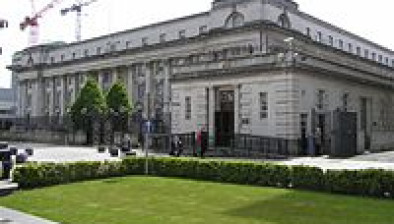Court of Appeal: Costs order against State overturned in case brought by murder victim’s family

Andrew McKeown BL
The Court of Appeal, in a judgment delivered by its president, Mr Justice George Birmingham, has allowed the State’s appeal challenging an order that it pay half the legal costs of a murder victim’s family.

About this case:
- Citation:[2020] IECA 310
- Judgment:
- Court:Court of Appeal
- Judge:Mr Justice George Birmingham
Background
On 1 May 1976, Seamus Ludlow left the Lisdoo Arms pub in Dundalk and was seen shortly after midnight outside a garage hitching a lift home, which was about two miles away. He did not return home. He had lived with his mother and his sister’s family at Mount Pleasant, and when his sister found that he had not returned home, she began a search. His body was found on 2 May, in a lane half a mile from his home.
No one was ever charged with his murder. The family said An Garda Síochána ignored an important line of inquiry, namely that Mr Ludlow was a victim of either British Army or loyalist paramilitaries who mistook him for a member of the Provisional IRA. They claimed that Gardaí failed to question a group of eight SAS men who were discovered in Ireland shortly after the murder. His family also believed that, at the time, Gardaí were conducting an orchestrated and persistent smear campaign against him by making unfounded allegations that he was murdered by the IRA for being an informer. They said this theory was circulated without any supporting evidence.
Despite identification of suspects in Northern Ireland by the RUC, the investigation was suspended, after three weeks, without explanation. The family claimed that a local garda had informed them of his belief that orders to halt the investigation into the murder came from Dublin.
An Inquiry was carried out by retired Supreme Court judge, Mr Justice Henry Barron. The Barron Report concluded that Seamus Ludlow had been returning home from Dundalk, where he had been socialising, and was picked up by a car driven by a named individual (a Corporal in the Ulster Defence Regiment) which contained three other named individuals with loyalist paramilitary connections. Mr Ludlow had no known political affiliations and no information ever connected him with any subversive organisation. The judge found the murder was “a random, sectarian killing of a blameless Catholic civilian by loyalist extremists”.
The lack of follow up on the information provided by the RUC in 1979 was found both by Mr Justice Barron, and the Oireachtas Joint Committee on Justice, Equality, Defence and Women’s Rights, to be a serious failure on the part of the gardaí.
Thomas Fox, Mr Ludlow’s nephew, took proceedings on behalf of the family against the Minister for Justice and Law Reform, the Attorney General and Ireland, seeking an order of Mandamus, directing the establishment of commissions of inquiry, pursuant to the Commission of Investigation Act 2004, to examine inter alia failures in the Garda investigation, as per the recommendations of the Oireachtas Joint Committee.
Ms Justice Mary Faherty found that the Judicial power had no jurisdiction to command the Executive to establish a commission of inquiry. Mr Fox was unsuccessful, and it was argued on behalf of the State that it was a case where there should be no order for costs. However, the judge directed the State to pay 50 per cent of Mr Fox’s legal costs.
Court of Appeal
He appealed and the State cross-appealed the award of costs in his favour. In the Court of Appeal, the State argued that they fully succeeded and that there should be an order for costs of the appeal in their favour. The State suggested that the High Court’s costs order should be vacated.
In May 2020, the court rejected Mr Fox’s appeal, finding that the State could not be compelled to establish the commissions of inquiry. Submissions in relation to costs were received from the successful State respondents in August 2020.
Mr Fox argued that the costs of the appeal should be awarded in his favour. He did so on the basis of a contention that it was a case where costs should follow the event and, in the alternative, that this was an exceptional case which involved novel and important points of law which would justify a departure from the normal rules. Mr Justice Birmingham noted that Mr Fox’s contention that the costs should follow the event might at first seem surprising. However, Mr Fox argued that the “event” should be identified as the publication of the Programme for Government on in June 2020, after the matter was heard in the Court of Appeal.
The Programme included a commitment to ensuring access by an independent, international judicial figure to all original documents relating to the Dublin and Monaghan bombings, as well as the Dublin bombings of 1972 and 1971, the bombing of Kay’s Tavern in Dundalk, and the murder of Seamus Ludlow, in accordance with the all-party motions in Dáil Éireann. Mr Fox relied on Godsil v Ireland [2015] 4 IR 535, a case about the entitlement of an undischarged bankrupt to contest elections.
Mr Justice Birmingham opined that Godsil did not provides any assistance to Mr Fox. Neither did he believe that the reference to the Programme for Government offered any support. He noted that Mr Fox had asserted that the Programme could only be explained, or else could be explained substantially, by reason of the present proceedings. The judge said that this assertion did not withstand scrutiny. The present proceedings related to one particular incident, being Mr Ludlow’s murder. The Programme, however, deals with “several different historical events which, to a greater or lesser extent, have been the subject of public disquiet and political controversy for many years. Far from the commitment in the Programme for Government providing a justification for the present proceedings, in my view, it shows that this was an issue that should always have been pursued in the political arena rather than in the courts.”
The judge said that the State respondents’ contention that they have wholly succeeded on this appeal was “entirely correct”, and that pursuant to the Legal Services Regulation Act 2015 s.169, or to Ord.99 RSC or a combination of both, costs must follow in their favour.
The judges also ruled that a necessary consequence of Mr Fox having brought an unsuccessful appeal was that he loses the benefit of the order for part-costs that he had received in the High Court.
Conclusion
On the cross-appeal, the court set aside the High Court order for 50 per cent costs in Mr Fox’s favour, and provided that there should be no order for costs in the High Court. Costs were awarded to the State.











